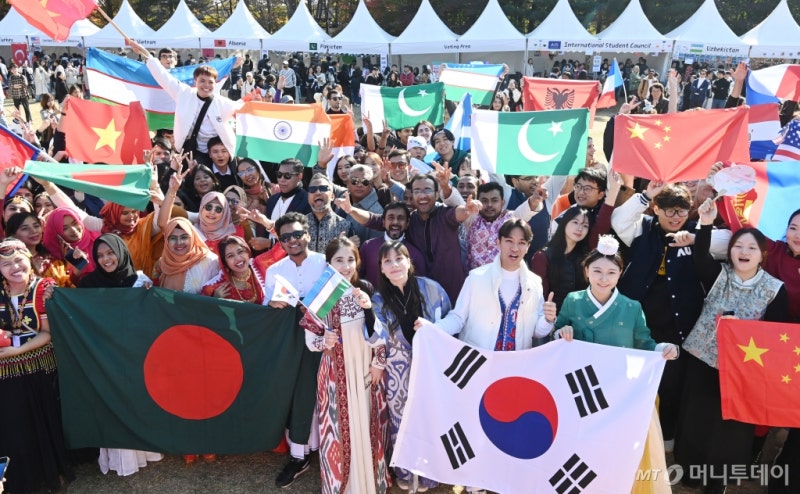
Discover New Opportunities for Foreign Students in South Korea
Hello, international readers! If you're considering studying abroad or just curious about life in Korea, you might be interested in how universities in Korea are evolving to attract foreign students. From cultural events to educational certification, there's a lot happening!
This article highlights a recent event in Suwon, called "Ajou International Day," where international students showcased their cultural heritage through dance, music, and food. But beyond cultural festivities, we'll explore the growing opportunities for foreign students in Korea, including the increasing number of accredited universities offering better systems for managing international students.
Overview of Recent Developments in International Education
As the number of foreign students in South Korea surpasses 200,000, the demand for quality education is on the rise. The Korean Ministry of Education and the Ministry of Justice have reported an increase in accredited universities, with 158 degree programs and 103 language training programs now available for foreign students. Accreditation not only provides a structured environment for studying but also simplifies the visa process for international students.
Benefits and Opportunities for Foreign Students
Accredited universities in Korea offer various benefits, including eased visa examination standards, participation preferences at the Korean Study Abroad Fair, and extra points for selection into the Government Scholarship Program (GKS). Additionally, colleges like Pusan National University have developed tailored job placement programs with major companies to support foreign students in securing employment after graduation.
How to Access and Apply: A Step-by-Step Guide
If you're interested in studying in Korea, here's a simple process to get started:
- Research universities that offer degree and language programs. Websites like Study in Korea are helpful resources.
- Check if the university is accredited. You can find updated lists of accredited schools on the Korean Study Abroad Information System.
- Prepare your application. This often includes your academic transcripts, proof of language proficiency, and a visa application. Ensure you meet the specific requirements of your chosen program.
- Complete the visa application process through the embassy or consulate, ensuring you have all the necessary documents.
Cultural Context: The Importance of Cultural Exchange
Events like Ajou International Day emphasize the importance of cultural exchange in education. By allowing students to engage with local customs and share their own, universities create a vibrant multicultural environment that's enriching for everyone involved. This is particularly significant in Korea, where harmony and collective experiences hold cultural value.
Tips for International Readers
Here are some practical tips if you're considering studying in Korea:
- Familiarize yourself with Korean culture and basic language phrases; many Koreans appreciate efforts to speak their language.
- Engage in university activities and clubs to meet new friends.
- Explore local neighborhoods to understand daily life in Korea.
Future Implications for International Students
The Korean government plans to revise accreditation criteria for universities next year, potentially making it easier for students to gain admission. This change reflects a commitment to enhancing the study abroad experience in Korea, aiming to attract more international talent.
Essential Information for International Readers
1. Who is eligible to study in Korea?
Foreign students from all over the world are eligible to apply to accredited universities in Korea, provided they meet admission requirements specific to their chosen programs.
2. Are there language requirements for foreign students?
Most universities require proof of Korean language proficiency for programs taught in Korean. However, many institutions offer English-taught programs, which may have different linguistic requirements.
3. How can I apply and access programs as a foreign student?
Application processes vary by university but generally involve online submissions through the university's website, along with supplemental documentation like transcripts and proof of proficiency in the language of instruction.
In conclusion, the landscape of international education in Korea offers vast opportunities. Whether you're interested in cultural experiences or academic growth, studying in Korea could be an enriching chapter in your life. Explore accredited universities and start your journey today!
Learn Korean with BeraKorean Community! 🎓
Want to improve your Korean language skills? Join BeraKorean, a vibrant community platform for learning Korean! Download our apps:
- 📱 Android: Download on Google Play
- 🍎 iOS: Download on App Store
📺 Subscribe to our BeraKorean YouTube Channel for engaging Korean learning content!
Visit berakorean.com to start your Korean learning journey today!
🔗 Want to learn more? Check out the original Korean article here: Read the original article
Tags: #KoreaLife #ExpatKorea #LifeInKorea #KoreanOpportunities #ForeignerInKorea #KoreaGuide